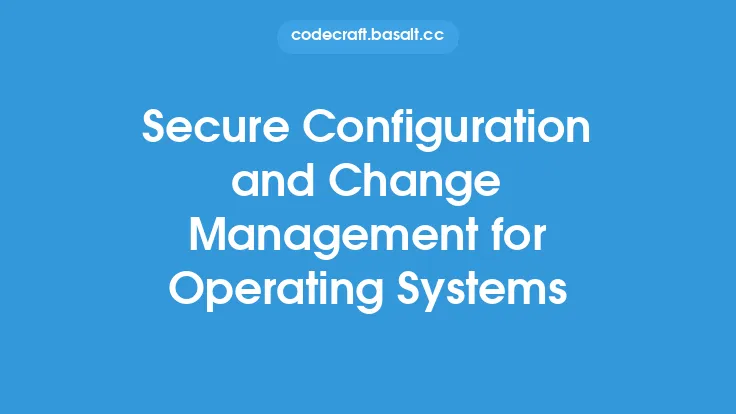Memory management is a critical component of operating systems, responsible for managing the allocation and deallocation of memory for various programs and processes running on a computer. It plays a crucial role in ensuring the efficient use of memory, preventing memory-related errors, and optimizing system performance. In this article, we will delve into the fundamentals of memory management in operating systems, exploring its importance, key concepts, and techniques.
Importance of Memory Management
Memory management is essential for several reasons. Firstly, it enables multiple programs to run concurrently on a computer, sharing the same physical memory. This is achieved by allocating separate memory spaces for each program, preventing them from interfering with each other. Secondly, memory management helps to prevent memory-related errors, such as memory leaks, dangling pointers, and buffer overflows, which can lead to system crashes, data corruption, and security vulnerabilities. Finally, effective memory management optimizes system performance by minimizing memory waste, reducing the time spent on memory allocation and deallocation, and improving the overall responsiveness of the system.
Key Concepts in Memory Management
Several key concepts are fundamental to understanding memory management in operating systems. These include:
- Process: A program in execution, which requires memory to run.
- Memory space: The amount of memory allocated to a process.
- Memory allocation: The process of assigning memory to a program or process.
- Memory deallocation: The process of freeing up memory that is no longer needed.
- Memory fragmentation: The condition where free memory is broken into small, non-contiguous blocks, making it difficult to allocate large blocks of memory.
- Paging: A memory management technique that divides memory into fixed-size blocks, called pages.
- Segmentation: A memory management technique that divides memory into variable-size blocks, called segments.
Memory Management Techniques
Operating systems employ various memory management techniques to optimize memory usage and prevent memory-related errors. These techniques include:
- Static memory allocation: Memory is allocated to a program at compile-time, and the allocation is fixed throughout the program's execution.
- Dynamic memory allocation: Memory is allocated to a program at runtime, and the allocation can change during the program's execution.
- Memory pooling: A technique where a large block of memory is allocated and divided into smaller blocks, which are then allocated to programs as needed.
- Memory protection: A technique that prevents programs from accessing memory that is not allocated to them, using mechanisms such as page tables and segmentation.
Memory Management in Modern Operating Systems
Modern operating systems, such as Windows, Linux, and macOS, employ a combination of memory management techniques to optimize memory usage and prevent memory-related errors. These operating systems use virtual memory, which is a combination of physical memory and secondary storage, such as hard drives or solid-state drives. Virtual memory enables programs to use more memory than is physically available, by temporarily transferring pages of memory to secondary storage when they are not in use. Additionally, modern operating systems use memory protection mechanisms, such as page tables and segmentation, to prevent programs from accessing memory that is not allocated to them.
Challenges in Memory Management
Despite the advances in memory management techniques, there are still several challenges that operating systems face. These include:
- Memory fragmentation: As programs allocate and deallocate memory, the free memory can become fragmented, making it difficult to allocate large blocks of memory.
- Memory leaks: Programs can leak memory by failing to deallocate memory that is no longer needed, leading to memory waste and potentially causing the system to run out of memory.
- Memory-related security vulnerabilities: Memory-related errors, such as buffer overflows, can be exploited by attackers to gain unauthorized access to the system.
Conclusion
In conclusion, memory management is a critical component of operating systems, responsible for managing the allocation and deallocation of memory for various programs and processes. Effective memory management is essential for preventing memory-related errors, optimizing system performance, and ensuring the efficient use of memory. By understanding the key concepts, techniques, and challenges in memory management, developers and system administrators can design and implement more efficient and secure operating systems. As computer systems continue to evolve, the importance of memory management will only continue to grow, making it an essential area of study and research in the field of operating systems.





